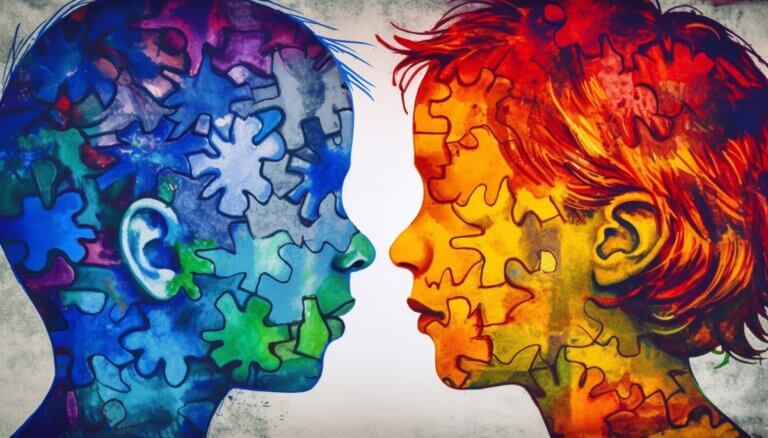Table of Contents
The Importance of Emotional Intelligence for Executives

Self-awareness and self-regulation
Self-awareness and the ability to self-regulate are key components of emotional intelligence, which play a crucial role particularly in employee communication and effective team communication. Every leadership dialogue significantly benefits from a leader who is aware of their own emotions and knows how to regulate them to positively influence their team.
A well-developed self-awareness enables leaders to identify and understand their own feelings. This is essential, as these inner states can influence their decisions, behavior, and communication skills. Through this conscious process, they are able to critically reflect on themselves and monitor their emotional responses in the context of emotional intelligence in team communication.
Self-regulation, on the other hand, is the process of managing and adjusting emotional responses to various situations in the everyday work environment. This requires discipline and the ability to control impulses from the leaders, which in turn leads to pronounced emotional conversation management.
Practical Examples from Everyday Leadership
An example of good self-awareness and self-regulation is shown when a leader responds calmly and thoughtfully after receiving negative company figures, rather than panicking. They quickly realize that their mood and reaction can directly transfer to the employees, and choose a constructive approach to discuss solutions.
Another example is the productive handling of conflicts. An emotionally intelligent leader notices when anger or frustration is building up and employs self-regulation techniques such as deep breathing or short breaks to avoid escalation. This ensures that the leadership dialogue remains constructive and solution-oriented.
Influence on the Work Environment
Through high self-awareness and pronounced self-regulation, a role model function is established that can positively influence the entire work environment. Others see how emotional difficulties are effectively managed and learn to emulate these skills. Thus, the leader significantly contributes to an atmosphere where open and emotional conversation management is encouraged, thereby strengthening effective communication in the company.
The support and training of leaders in the areas of emotional self-awareness and self-regulation is thus an investment in the healthy development of a company and its employees.
Empathy and Social Responsibility
Emotional Intelligence and the Art of Leadership Dialogue
Emotional intelligence in team communication is indispensable for any effective leader. The ability to recognize and respond to emotional signals from employees creates a leadership dialogue that builds on trust and understanding. In our fast-paced work environment, it is crucial that managers are not only technically competent but also emotionally intelligent.
The Role of Empathy in Employee Communication
A key aspect of emotional intelligence is empathy. It allows leaders to delve deeper into employee communication to foster a genuine exchange. For example, when an employee displays signs of stress, it’s important for the manager to recognize these signals and respond appropriately. Empathy means putting oneself in the other’s position and understanding their emotions without judging them. In a case study, a team leader noticed that the performance of an otherwise very committed employee had declined. Instead of immediately criticizing, he initiated a personal conversation and discovered that family issues were the cause. Through his empathetic approach, he was able to support the employee and restore their performance.
- Observing behavioral changes and recognizing emotional signals.
- Conducting conversations on an equal footing with the aim of understanding the reasons for changes.
- Showing empathy and jointly searching for solutions.
Social Responsibility as a Leadership Task
Another important component of emotional intelligence is social responsibility. It manifests itself in the endeavor to create a work environment characterized by support and cooperation. Social responsibility not only fosters the individual development of each employee but also the team dynamics and ultimately the overall performance. A study by the American Management Association shows that teams led by empathetic leaders demonstrate a higher commitment to the company and are more productive. This is reflected in democratic decision-making processes, the appreciation of diversity, and a culture of mutual respect.
- Creating an open corporate culture that promotes diversity and mutual appreciation.
- Developing team structures that favor collaboration and mutual support.
- The leader acts as a role model for socially responsible behavior.
The Practice of Emotional Conversation
Effective communication is the lifeblood of any organization. However, it truly comes alive through the practice of emotional conversation. It is the combination of active listening, the honest expression of one’s own feelings, and the desire to act for the benefit of the team that defines emotional conversation. This open exchange not only enhances individual performance but also strengthens the sense of unity and common goals.
- Using active listening techniques to deepen understanding between conversation partners.
- Exchanging feedback that is constructive and encouraging.
- Promoting a dialogue that takes place on an equal footing and sees employees as equal partners.
Genuine empathy and social responsibility are essential components of emotional intelligence that should be inherent in every effective leader. Through their continuous development and application in daily leadership, the path is paved for a truly humane and high-performing organization.
Applying Emotional Intelligence in Team Communication

Application of Emotional Intelligence in Team Communication
Effective listening and providing feedback are crucial skills for shining in employee communication and leadership dialogues. Emotional intelligence in team communication plays a fundamental role here. It’s about not just hearing the spoken words, but also understanding the underlying feelings and needs.
The Role of Emotional Intelligence in Listening
Emotional intelligence enables leaders to perceive not only the content but also the emotional messages of employees. Effective listeners notice facial expressions, gestures, and tone of voice, thus better addressing the true concerns of employees. This achieves effective communication, contributing to a healthy and productive work environment.
- Active Listening: Those who not only hear but understand their conversational partners and indicate this through verbal and nonverbal feedback create trust and openness.
- Show Empathy: Empathizing with the emotional world of others allows for a deeper, more human level of interaction and appreciation.
- Constructive Feedback: The ability to express appreciation and communicate suggestions for improvement in an emotionally intelligent manner encourages employee development and motivation.
Constructive Feedback in Practice
Communication marked by genuine concern for the development and well-being of team members can work wonders. Here, a clear structure in the feedback process is essential. The Situation-Behavior-Impact (SBI) feedback method is useful:
- Situation: Start with describing the situation in which the observed behavior occurred.
- Behavior: Specifically name the behavior, not the person, to avoid defensiveness.
- Impact: Explain the impact of the behavior to raise awareness of the consequences.
Empowerment through Emotional Conversation Leadership
Emotional intelligence and effective communication are indispensable tools for inspiring leadership. A leader who demonstrates and practices emotional intelligence in team communication conveys to team members the feeling of being heard and understood. Through this careful employee communication and feedback culture, a positive work climate emerges, in which every individual employee feels recognized, thus being more motivated and committed to their tasks.
Through the interplay of active listening, showing empathy, and the ability to give constructive feedback, leaders strengthen their own emotional intelligences and simultaneously foster those of their employees. Thus, a dynamic team develops, in which challenges are mastered with respect, understanding, and collective commitment.
Conflict Management and Interpersonal Relationships
Emotional intelligence as a key competency in conflict management starts with understanding and regulating our own emotions. When leaders master this art, they can not only resolve conflicts within the team efficiently but also shape employee communication and emotional conversation in a way that strengthens the team.
Reading Emotions and Responding
A leader trained in emotional intelligence can detect subtle emotional signals in employees and respond to them. Recognizing dissatisfaction or stress early on can help defuse conflicts before they escalate. A practical example of this is the leadership dialogue during a team meeting. Here, effective communication is demonstrated by recognizing nuances in voice or body language and addressing them immediately.
An initial sign of discontent might be a sigh, followed by a slight lean back, which could indicate withdrawal and frustration. An emotionally intelligent leader would pick up on this by actively listening and empathetically probing to foster the conversation.
Emotion Regulation as a Tool
Emotional intelligence in team communication enables controlling one’s reactions thereby creating a de-escalating atmosphere. Consider a tense project situation where two team members disagree. Rather than taking sides, a leader with high emotional intelligence could acknowledge the emotions of both parties and initiate a solution-oriented dialogue.
- It is essential to show the individuals involved that their feelings are understood and valued, without emotionally charging the discussion.
- By asking targeted questions and promoting an open discussion, the leader steers the conversation in a constructive direction.
- The ability to self-regulate also allows acting as a neutral and calming presence, which lowers the overall stress level and facilitates the search for solutions.
Empathy as a Connecting Element
Empathy in communication means putting oneself in the position of others and showing understanding for their perspectives. It is not about merely agreeing, but about creating a foundation from which conflicts can be resolved.
One example is seen in managing intercultural teams: Different cultural backgrounds can lead to misunderstandings. An empathetic leader will make efforts to understand cultural differences and promote respect for diversity, so that every team member feels heard and valued.
In synthesizing these components – reading emotions, regulating one’s own reactions, and empathy – emotional intelligence proves to be a decisive tool not only in resolving conflicts but also as an opportunity for growth and strengthening interpersonal relationships.
Summary
Emotional intelligence in team communication is essential for effective leadership and includes key factors such as self-awareness and self-regulation. These two aspects significantly contribute to successful employee communication and enrich leadership dialogue.
Self-awareness allows leaders to understand their own emotions and reflect on decisions and behavior. For example, a leader can remain calm despite negative company performance and show constructive solutions. Self-regulation, on the other hand, refers to adjusting emotional responses in various work situations. Self-regulation techniques, such as deep breathing or taking breaks, help leaders maintain composure during conflicts.
Examples of Emotional Intelligence in Practice
Another key point is social responsibility. When leaders show empathy and create a supportive environment, it leads to stronger team cohesion and improved overall performance. Emotional conversation management includes active listening and the ability to communicate feedback constructively and empathetically. This promotes a culture within the company where employees feel valued and understood.
Effective communication and the role of emotional intelligence in this are undeniable. A leader with strong emotional intelligence can recognize verbal and nonverbal signals and respond appropriately. This leads to deeper understanding and helps nip conflicts in the bud.
In the context of the feedback process, the Situation-Behavior-Impact method has proven to be particularly effective. It includes:
- A clear description of the situation.
- An objective presentation of the behavior without personal evaluation.
- Illustrating the impact of the behavior to raise awareness of consequences.
In conclusion, effective communication, supported by emotional intelligence in employee communication, forms the foundation for a strong, resilient, and productive work climate. Leaders who exemplify and promote these skills enable their teams to overcome common challenges and create an environment of trust and commitment. Here, active listening, targeted emotion regulation, and demonstrating empathy are invaluable.
FAQ – Emotional Intelligence in Employee Communication
How can emotional intelligence help reduce misunderstandings in communication between leaders and their teams?
Emotional intelligence enables leaders to better understand the emotional states of their team members and to respond to them with empathy, leading to clearer transmission and reception of messages. Increased self-awareness and empathy can reduce misunderstandings in communication, as emotionally intelligent leaders take into account the perspectives of others and thus refine their way of expression. This creates an environment of respect and openness within the team, which is essential for effective communication.
How can emotional intelligence lead to more effective feedback in team discussions among leaders?
Emotional intelligence enables leaders to deeply understand the emotional landscape of their team members, leading to more empathetic and personally resonant feedback. With this empathy, they can shape feedback in a way that is constructive and motivating, rather than eliciting defensive reactions. As a result, they create an atmosphere of trust and openness, where employees feel valued and can effectively work on their development.
How can emotional intelligence in leaders lead to more effective communication with their teams?
Emotional intelligence enables leaders to better perceive, interpret, and appropriately respond to the emotional signals of their team members, enhancing mutual understanding and trust. By understanding their own emotions and those of others, they can shape communication in a way that motivates, fosters productive exchange, and defuses conflict situations. This creates an atmosphere where employees feel valued and open to providing feedback, which sustainably improves team performance and the work environment.




